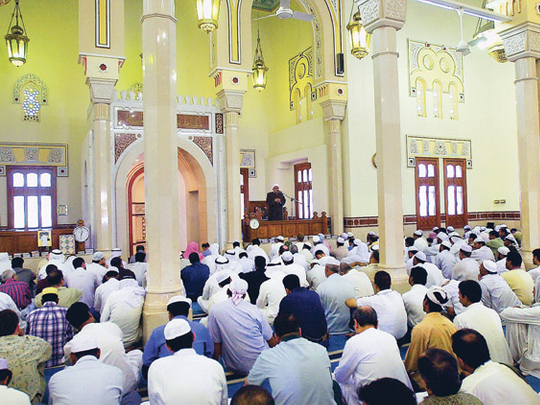
Dubai: A survey of 4,500 people by a Riyadh-based religious website has found that many fatwas issued by Muslim clerics are, in fact, unclear and called for more control over how they are issued.
The aim of the Islamfeqh.com survey was to shed light on frequently asked, sometimes controversial, questions.
More than 4,500 people called 11 Arab satellite channels over a period of three months with questions about religious rulings on a wide range of topics including prayer, the banking system, divorce and marriage.
People like to feel reassured about adherence to their religious teachings, experts and scholars say.
However, after surveying the questions and responses, some scholars felt that issuing fatwas should be more controlled, and these religious edicts should be limited only to authorised and well-informed scholars, they stressed.
"We criticise both sides," said Khalid Al Daieji, a religious researcher who moderates Islamfeqh.com.
"We criticise the scholars for not appearing on television channels. They're supposed to come into sight, [but] they don't. We also criticise the appearance of non-qualified people on TV issuing fatwas," Al Daieji told Gulf News.
The Riyadh-based website has been established by several scholars from Saudi Arabia and abroad. It provides the browser a chance to check Islamic rulings and ask about Islam's teachings.
Answers in ‘scholar voice' are sent by email.
"Not everyone can issue a fatwa," said Al Daieji, who obtained his PhD in Islamic Fiqh (Jurisprudence).
"Issuing fatwas is of great importance. Even the companions of Prophet Mohammad [PBUH] used to hesitate in issuing fatwas because it is a big responsibility. It is as if you are decreeing on behalf of God."
Controversial edicts
Several months ago, some strange fatwas raised controversies in Arab Muslim societies, and were immediately withdrawn. An example is the one where a lecturer at Al Azhar issued a fatwa saying work colleagues of the opposite sex could escape the ban on unmarried men and women being alone together if the woman breast-fed her male colleague five times.
The lecturer's rationale was breast-feeding established a maternal rather than a sexual relationship.
In the first analysis of its kind, the website surveyed 11 Arab satellite channels during the first three months of the year. The channels are broadcast from several Arab countries, including Saudi Arabia, Egypt, Palestinian territories and Kuwait.
The Saudi channels are: Daleel, Al Resalah, Al Majd, Al Quran Al Kareem, while the Egyptian channels are: Al Nas, Al Rahmah, Dream 2 and Al Quran Al Kareem.
From the Palestinian territories both Al Quds and Al Aqsa — which reflect the positions of both the Palestinian Authority and the Hamas movement respectively, and in Kuwait the Ana satellite TV channel.
The survey found 244 shows that were concerned with issuing fatwas on the channels, and counted 4,571 queries.
Interestingly, Muslims from 17 countries called the TV programmes. People also called from European countries including Austria, Britain, Germany, Belgium and France.
"Muslim communities in Western and Asian countries need these programmes in which scholars participate, as [many in the diaspora] don't have Muslim scholars and religious figures to issue fatwas," Al Daieji said.
Islamfeqh.com now plans to offer an English service to non-Arab speakers, he noted.
Accuracy
New technology has helped with the obstacles of time and distance, but it can be difficult to measure the accuracy of what is being dished out. So, there's a need for a control, Al Daieji said.
"Any religious programme should get authorisation from the highest authority in that country, and no religious figure should be allowed to go on air before being approved. They are interpreting God's rulings."
The survey, meanwhile, also noted that other faults need to be rectified.
Some replies do not actually answer questions or are simply insufficient, the survey results showed. And some answers are not substantiated with detailed and relevant proofs, while some either lack a clear religious ruling or just need revision.
The use of inappropriate words or expressions was also found to be common.
The Islamic website is expected to release its second report in the next two months.
Who should be authorised to issue fatwas? Do you like to watch television programming that aims to answer religious questions? Or do you find it too commercial?












